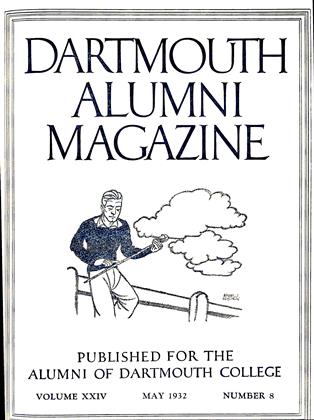THEBE are three ways of getting jobs in Hanover, and four general types of work. The College, the Dartmouth Christian Association, and personal initiative are the channels for getting work. Food and board, work for the College, odd jobs, and "business" of various kinds, are the types of employment open. Scholarship aid, generously granted by the College, and summer work will not be discussed here.
Food takes first place. The College hires about 70 men, 50 of whom are freshmen, for work in freshman commons, the cafeteria, and grill. They work for their food with no other payment. There are three bona fide restaurants in the metropolis of Hanover. Three other establishments hire from one to three students each. The Hanover Inn takes care of a few, and numerous eating clubs, pnvatelv run, furnish a considerable number of waiters' jobs. Holders of this work are the elite of Hanover's laborers. Their jobs are worth about $350 a year in food, and competition is so keen that they are forced to meet requirements which would be ridiculous under other circumstances. One of the requisites for holding an eating club job is usually obtaining a "table" of men, whom the worker is personally responsible for getting and keeping. If the men do not like the food and quit, so does the worker's job!
A few students have managed to locate private homes where, in return for stipulated amounts of housework and baby care, they are given a room, rent free.
As competition becomes more and more keen, College—supervised work is being concentrated in the Personnel Bureau, where Prof. Francis J. A. Neef, bureau director, can examine the record of any student and allot work according to relative need. Supervised work for the College consists of steady jobs in Baker library, in the gymnasium as recreational checkers, occasional work during rush periods in the offices of Administration, and ushering at athletic contests and dramatic presentations.
D. C. A. HELPS
All that remains upon which the investigatory finger many be laid is the D. C. A. record of "odd job" employment. Secretary Charles E. Butler's records contain a threeyear survey bearing out the general situation to a marked degree. The number of jobs for the three years is almost constant. The number of men applying has increased.
For the entire year, September to June, 1927-28, 102 jobs were filled. From September to December, 1930, half that time, 52 were filled, and for the same period in 1931, 52 were filled. In 1930, however, there were 61 men on the D. C. A. waiting list. Now there are 85.
RESTRAIN DELIRIUM TREMENS
The usual pay for this work is forty cents an hour. It ranges all the way from light and heavy housework to the care of a delirium tremens patient, at the Mary Hitchcock Memorial Hospital, whose pink elephants were recurring too often and too violently to be comfortable for the nurses in charge. Chauffeurs, typists, models for amateur artists, student draughtsmen to print posters, carpenters, salesmen, filing clerks, tutors, laundry canvassers, and tennis instructors have also been in demand at one time or another.
Then there's the "business and professional" man, a group which it is almost impossible to run down. Those are the lads who have real ability and economic acumen. Sometimes (legend has it) they go through college and are cast forth into the world untold dollars ahead of the game.
The editors of the Dartmouth, the Aegis, the Jack-o-Lantern, the Freshman Green Booh and other college publications, having reached their eminent positions after four years of the stiffest kind of competition with their classmates, run those organs for better or worse and divide whatever profits accrue.
Palaeopitus, student governing body, yearly picks deserving men who have the need and ability to handle dormitory and special train food concessions for a profit.
Three lucky members of Cabin and Trail, that exclusive organization of student outdoor men, get summer jobs at $2 a day "and found" working on the Outing Club's line of trails, cabins, and shelters.
ODD JOBS
Meanwhile, the students support at least one thriving concern of student pressers and cleaners, untold "agents" for clothing, sports goods, and other commodities (although dormitory canvassing is forbidden), even some daring entrepreneurs who handle orchestras seeking to obtain engagements for Carnival or house parties, and several enterprising young men who augment their incomes with newspaper writing as metropolitan correspondents and members of the Dartmouth Press Club.
And then there was the talented nephew of a famous sculptor whose piquant drawings, both as art and advertising, gave him an earning power far beyond the dreams of most of his classmates. His kind, however, come but once in a generation. Possibly once in a while someone shares profits on an Irish Derby or a cigarette ad contest. One man made $25 in choosing the name of a local restaurant.
Dartmouth democracy may be an old tradition but it is one which has withstood the years and now appears to be as strong as ever.
 View Full Issue
View Full Issue
More From This Issue
-
 Class Notes
Class NotesCLASS OF 1929
May 1932 By Frederick William andres -
 Article
ArticleDirectory of Alumni Associations and Classes
May 1932 -
 Lettter from the Editor
Lettter from the EditorPublic or Private Schools: A Letter to the Editor
May 1932 By Louis P. Benezet -
 Article
ArticleA Student in the Early Eighteen Hundreds
May 1932 By Mary B. Slade -
 Class Notes
Class NotesCLASS OF 1905
May 1932 By Arthur E. McClary -
 Article
ArticleLetch worth Village—A Home for Mental Defectives
May 1932 By Charles S. Little, M.D.







